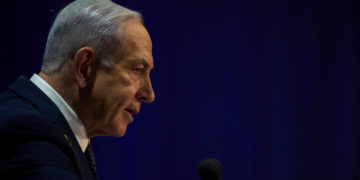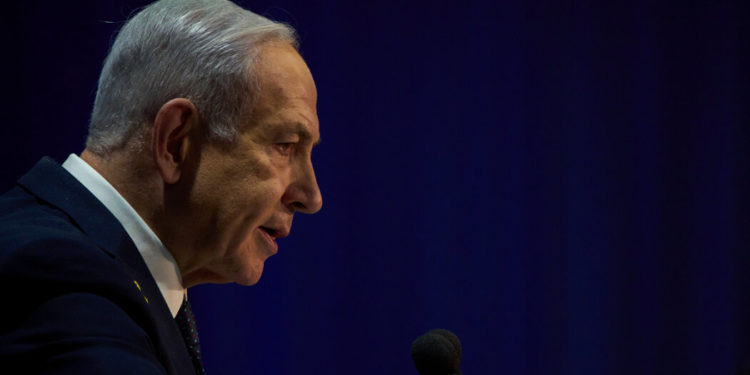As Benjamin Netanyahu, the Israeli prime minister, has led his country through 18 months of war in Gaza, he has also been locked in a less visible conflict at home — against parts of the Israeli state.
On Monday, a sequence of court hearings, detentions, interrogations and government announcements highlighted how destabilizing that domestic fight has become.
Exhibit A: Mr. Netanyahu spent the morning in court in Tel Aviv for the latest session of his yearslong corruption trial. The prime minister is accused of granting regulatory favors to businessmen in exchange for bribes and positive news coverage — charges he denies.
Exhibit B: By the afternoon, Mr. Netanyahu had left court early to be questioned in Jerusalem by police officers investigating a new and separate case involving the prime minister’s aides, according to three officials who spoke on the condition of anonymity to speak more freely.
Exhibit C: During the course of the day, two of those aides were detained, the officials said.
Exhibit D: Against that backdrop, Mr. Netanyahu pressed ahead with efforts to replace a senior intelligence chief, Ronen Bar, who helped instigate the investigation against the prime minister’s aides.
On Monday, Mr. Netanyahu’s office announced that Eli Sharvit, a former Navy commander, had been nominated to replace Mr. Bar, the current head of the Shin Bet, Israel’s domestic spy agency. The move stopped short of immediately ousting Mr. Bar, but it tested the limits of a Supreme Court order that suspended Mr. Bar’s dismissal until April 8.
Even by the chaotic standards of contemporary Israel, the accelerating sequence of clashes between Mr. Netanyahu and other state institutions was breathtaking in its intensity.
In less than a day, Mr. Netanyahu came under pressure from the police; accelerated a battle with the Shin Bet; went head-to-head against state prosecutors, and edged closer to a constitutional showdown with the Supreme Court.
All the while, Mr. Netanyahu continued to oversee Israel’s longest-ever war. On Monday the Israeli military continued to step up its operations in Gaza, ordering Palestinian civilians to leave Rafah, a major city on the border with Egypt, suggesting a bombardment was imminent. Israeli troops also continue to occupy territory in Lebanon and Syria, and remain on alert for attacks from Hamas’s allies in Yemen.
“It’s crazy and hard to believe what’s going on,” said Ami Ayalon, a former director of the Shin Bet.
Mr. Ayalon compared the combination of internal and external conflicts to the years preceding the fall of Jerusalem in the first century, when Jewish factions battled each other as the Roman Army prepared to sack the city. “That is the only comparison, when you had Jews killing each other inside Jerusalem, and the Romans outside, surrounding the city,” Mr. Ayalon said.
Mr. Netanyahu has been at loggerheads with the judiciary and sections of law enforcement since 2016, when he was first investigated for corruption. His prosecution began in 2020, and his refusal to resign while standing trial left the Israeli electorate divided roughly evenly between his supporters and critics. That split caused profound electoral instability and led to five elections in less than four years.
Now, Mr. Netanyahu is contending with a separate investigation — instigated last fall by the Shin Bet — into advisers and communications experts in his office.
Mr. Netanyahu is not a suspect in that second case, but his aides are accused of leaking classified information to a foreign newspaper and receiving payments from people connected to the Qatari government.
Mr. Netanyahu’s critics have accused him of firing Mr. Bar for failing to end that investigation. .
Mr. Netanyahu has denied the charge, saying that Mr. Bar was dismissed because of a breakdown of trust between the two men. Mr. Netanyahu has also blamed Mr. Bar for lapses early on the morning of Oct. 7, 2023, that allowed Hamas to launch its attack on Israel that day and ignite the war in Gaza.
A Qatari government official said the claims were a “smear campaign” aimed at derailing Qatar’s efforts to mediate an end to the war in Gaza.
The standoff over Mr. Bar is at the heart of a broader dispute among Israelis about how the country should be governed. It is the latest in a series of moves by the prime minister to expand his executive power and diminish the influence and independence of the judiciary and law enforcement agencies.
Last week, Israel’s governing coalition passed a law in Parliament that gives politicians more control over the selection of Supreme Court justices. And earlier in March, the cabinet began the process of firing the government’s top lawyer, Gali Baharav-Miara, who has angered Mr. Netanyahu by questioning the legality of government decisions — including the dismissal of Mr. Bar.
To Mr. Netanyahu and his supporters, the moves are an attempt to enhance Israel’s democracy by giving elected lawmakers greater control over the country’s direction. To his opponents, they are an attempt to shield politicians from scrutiny and accountability, edging Israel toward autocracy, and to stop Mr. Netanyahu’s trial.
In particular, critics view the move against Ms. Baharav-Miara, who oversees the ongoing prosecution of Mr. Netanyahu for corruption, as an attempt to undermine the trial. Mr. Netanyahu denies both the corruption charges and the claim that he is trying to undermine the proceedings.
On Monday, he also presented Mr. Sharvit’s nomination as simply the promotion of a worthy professional.
“Vice Admiral Sharvit served in the I.D.F. for 36 years, including five years as commander of the Israel Navy,” Mr. Netanyahu’s announcement said, using an abbreviation for Israel Defense Forces. He added that Mr. Sharvit helped build the “maritime defense of the territorial waters and conducted complex operations against Hamas, Hezbollah and Iran.”
Mr. Netanyahu’s allies even wondered if Mr. Sharvit might prove too independent, following reports that he had protested in 2023 against the government’s efforts to reduce judicial power.
But opposition leaders, while acknowledging Mr. Sharvit’s leadership qualities, complained that he had been appointed without due process.
Now, Israelis are waiting to see how the Supreme Court will assess Mr. Bar’s dismissal at the planned hearing on April 8 — and how Mr. Netanyahu will respond.
“No one knows where it’s going,” Mr. Ayalon said.
Reporting was contributed by Natan Odenheimer and Aaron Boxerman in Jerusalem, Gabby Sobelmanin Rehovot, Israel, and Myra Noveck in Jerusalem.
Patrick Kingsley is The Times’s Jerusalem bureau chief, leading coverage of Israel, Gaza and the West Bank. More about Patrick Kingsley
The post Netanyahu, Standing Trial for Corruption, Summoned for Questioning in 2nd Case appeared first on New York Times.



















